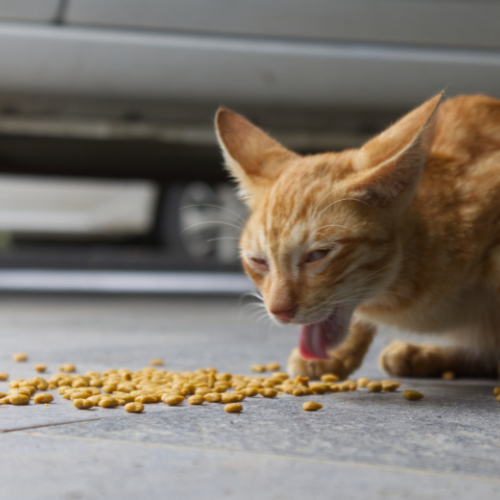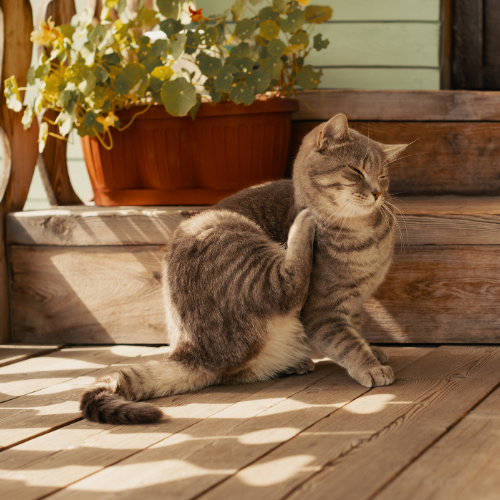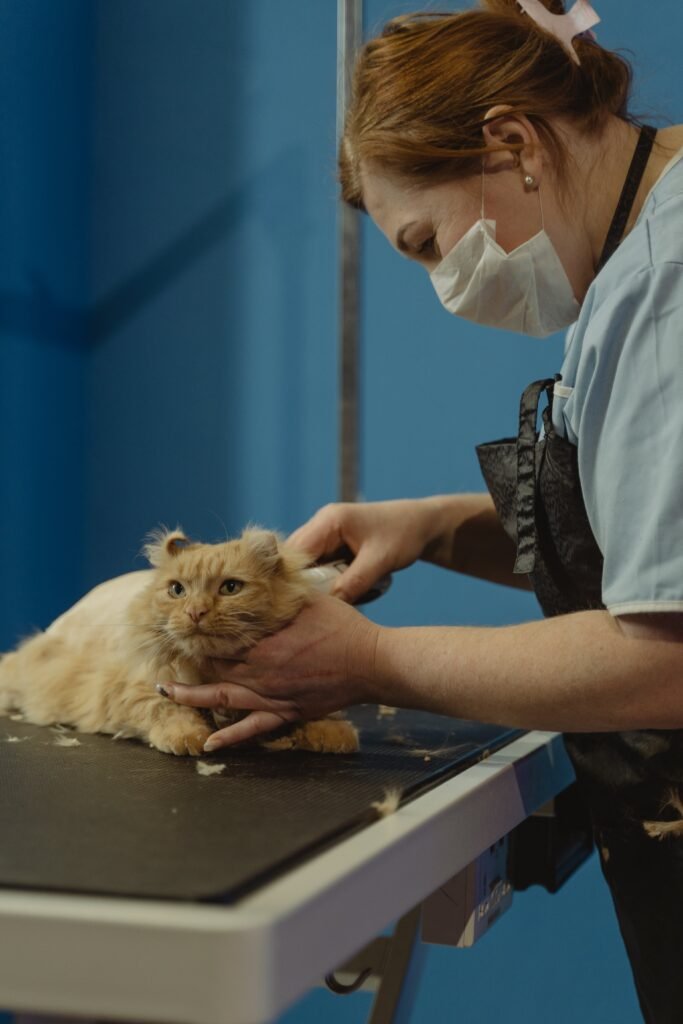Cat Food Allergies Symptoms Just like humans, cats can develop food allergies. If your cat has been scratching a lot, losing fur, or having tummy troubles, food allergies might be the cause. Recognizing the symptoms early is important because untreated food allergies can lead to more serious health problems. In this post, we’ll explore the signs of cat food allergies, how they’re diagnosed, and what you can do to help your cat feel better.
Common Symptoms of Cat Food Allergies
Food allergies in cats can show up in different ways, but there are a few key signs to watch for:
- Itchy Skin and Excessive Scratching: One of the most common signs of a food allergy is itchy skin. Your cat may scratch more than usual, especially around their face, ears, and neck.
- Hair Loss and Bald Patches: Cats with food allergies often lick or bite their skin to relieve the itch, which can cause bald spots or areas of thinning fur.
- Gastrointestinal Issues: Food allergies can also affect your cat’s stomach, leading to vomiting or diarrhea. If your cat is frequently sick after eating, it could be a sign of an allergy.
- Swollen or Red Paws: Allergic reactions can cause inflammation, making your cat’s paws look swollen or red. You may notice them licking their paws more than usual.
- Frequent Ear Infections: Chronic ear infections or wax buildup can be linked to food allergies, especially if they happen often.
- Coughing or Sneezing: Some cats develop respiratory symptoms like coughing or sneezing, though this is less common than skin or digestive problems.



Understanding Food Allergies vs. Food Intolerances
It’s important to know the difference between a food allergy and a food intolerance. A food allergy involves the immune system overreacting to a specific protein in the food, while a food intolerance usually just causes digestive problems without an immune response.
For example, a cat with a food allergy might have both skin and stomach problems, while a cat with food intolerance might only experience vomiting or diarrhea. Common food allergens for cats include chicken, fish, beef, and dairy.
How Food Allergies Affect Your Cat’s Health
If left untreated, food allergies can cause long-term problems for your cat. The constant scratching and licking can lead to open sores and infections. Over time, chronic allergies can make it harder for your cat to absorb nutrients from their food, leading to malnutrition.
Food allergies can also affect your cat’s quality of life, making them uncomfortable or in pain. That’s why it’s important to recognize the symptoms and seek treatment as soon as possible.
Diagnosing Cat Food Allergies
Diagnosing a food allergy in cats can take some time because there’s no quick test to identify the problem. The most reliable method is an elimination diet, where you remove certain ingredients from your cat’s food and gradually reintroduce them to see which one causes the reaction.
Your vet may also suggest blood tests or food allergy testing, but these tests are not always accurate for food allergies. It’s important to work closely with your vet to rule out other possible causes of your cat’s symptoms before changing their diet.
Common Cat Food Allergens
There are a few common allergens that many cats react to:
- Animal Proteins: Chicken, beef, and fish are the most common protein sources that can cause allergies in cats.
- Dairy Products: Some cats are lactose intolerant, which can cause digestive issues if they consume dairy.
- Grains and Fillers: While less common, some cats may react to grains like wheat or corn, especially if they are sensitive to certain fillers found in lower-quality cat food.
Treatment for Cat Food Allergies
The best way to treat food allergies in cats is by switching to a different diet. Some options include:
- Hypoallergenic Cat Food: These foods are specifically designed to avoid common allergens and are often prescribed by vets.
- Limited-Ingredient Diets: These diets use a small number of ingredients, making it easier to identify what your cat is allergic to.
- Novel Protein Diets: Some cats do better with less common protein sources like duck, venison, or rabbit, which they are less likely to have been exposed to before.
In addition to changing your cat’s diet, your vet may recommend medications like antihistamines or steroids to manage severe allergic reactions or flare-ups.
Home Care Tips for Cats with Food Allergies
If your cat has food allergies, here are some tips to help manage their symptoms and keep them comfortable:
- Transitioning to a New Diet: When switching your cat’s food, do it gradually to avoid upsetting their stomach. Mix small amounts of the new food with their old food and increase the proportion over a week or two.
- Keeping Your Cat Comfortable: If your cat is scratching a lot, keep their nails trimmed to prevent them from injuring themselves. You can also use cat-safe creams or sprays to soothe irritated skin.
- Regular Grooming: Regular brushing can help remove allergens from your cat’s fur and reduce skin irritation.
Preventing Food Allergies in Cats
While you can’t always prevent food allergies, you can reduce the risk by introducing new foods slowly and paying attention to your cat’s reaction. If you notice any symptoms after introducing a new food, stop feeding it and consult your vet.
It’s also a good idea to choose high-quality cat food with minimal fillers and additives, as these can trigger allergic reactions in some cats.
When to See a Vet for Cat Food Allergies
If your cat shows any signs of a food allergy, it’s best to see a vet for advice. Chronic symptoms like vomiting, diarrhea, itching, or frequent ear infections shouldn’t be ignored. Your vet can help diagnose the problem and recommend a proper diet.
Conclusion
Cat food allergies can cause a range of symptoms, from itchy skin to digestive problems. Recognizing the signs early and working with your vet to diagnose and treat the allergy is key to keeping your cat healthy. By choosing the right diet and managing symptoms, you can help your cat feel better and prevent future flare-ups.
FAQs
1. Can a cat develop food allergies suddenly?
Yes, cats can develop food allergies at any point in their lives, even if they’ve been eating the same food for years.
2. How long does it take to see improvements after switching food?
It can take a few weeks for symptoms to improve after switching your cat’s food, as it takes time for the allergens to leave their system.
3. Are certain cat breeds more prone to food allergies?
There isn’t strong evidence that specific breeds are more prone to food allergies, but any cat can develop them.
4. Can I give my cat human food if they have food allergies?
It’s best to avoid giving your cat human food, as many human foods contain ingredients that can trigger allergies or upset your cat’s stomach.
5. How can I prevent flare-ups in the future?
Avoid reintroducing foods that triggered your cat’s allergies and stick to a consistent diet. Always introduce new foods slowly and watch for any signs of a reaction.


